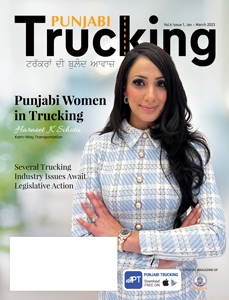Since 2007 the Women In Trucking Association has worked tirelessly to create a more gender diverse workforce for transportation careers. However, despite the gains women are making as drivers, managers, and leaders, there are still challenges women face that need to be addressed.
Catalyst Research studies trends for female employment and defines “made-dominated industries,” as a job held primarily by men. The English dictionary goes further and defines “male-dominated” as [an] area of activity is one in which men have most of the power and influence.” At Women In Trucking Association, we’ve changed our language to call trucking a “male populated,” industry, as we strive to be more dominant by increasing women’s power and influence.
The reason women enter trucking, especially as professional drivers, is because there is no pay disparity. Whether the pay rate is by the mile, the load, the hour, or a percentage, the pay is the same regardless of gender, age, or ethnicity.
The majority (83 percent) of women who enter trucking have been encouraged by a family member or friend. This is important, as they are aware of the lifestyle and the over-the-road nature of the job. For this reason, women are often better prepared by being more informed about the job as a professional driver.
The challenges women face are the same as men, but women are more vulnerable to certain issues, such as restroom access and safety and harassment concerns. Catalyst found that women in male-dominated industries were more likely to be harassed.
First, because of the smaller numbers, there are fewer mentoring opportunities for women to learn from and connect with other women. Secondly, the pressure to fit into the culture prompts many women to try to act like one of the guys, which further adds to more stress by adopting a different way of interacting. Catalyst also found that many women trying to prove themselves work much harder which often leads to burnout.
During the pandemic, the concern about the virus caused shutdowns in rest areas, restaurants, and loading docks. Access to restrooms was restricted and although both men and women were affected, women had greater challenges than men do not face. Male drivers often admit to “watering the tires,” but this isn’t as simple for women. Privacy is also needed for other physical needs only experienced by women, including pumping breast milk for infants.
Currently, there is a nationwide effort to require shippers to allow access to restrooms through legislative actions, but it’s a sad commentary on how our professional drivers are treated as they deliver the nation’s goods.
We’ve learned that women are more likely to leave a career if they don’t feel that the company has a positive safety culture. This includes three areas that start with the equipment’s age and level of maintenance. A broken-down truck is not safe for anyone, so a company with well-maintained trucks and a good safety record is the priority.
Secondly, the safety culture includes the driver’s personal safety when picking up or delivering as well as en route. Truck stops are cited as the worst areas for women regarding their safety (and harassment), so carriers with their own operating centers and driver facilities are more attractive to female drivers.
Finally, a positive safety culture means the driver is the person making the determination when the roads are slick and snow-covered, if a hurricane is predicted, or even if a protest is in the area. If a driver does not feel comfortable in the expected conditions, the response of the dispatcher will reveal whether the company respects her decision to take a break.
We all want to see a more gender-diverse workforce in transportation careers, but we still have some challenges that need to be addressed. Join the Women In Trucking Association (www.womenintrucking.org) and help us remove these obstacles.
Ellen Voie, CAE
Founder
Women In Trucking Association, Inc.
888-464-9482 920-312-1350 Mobile



